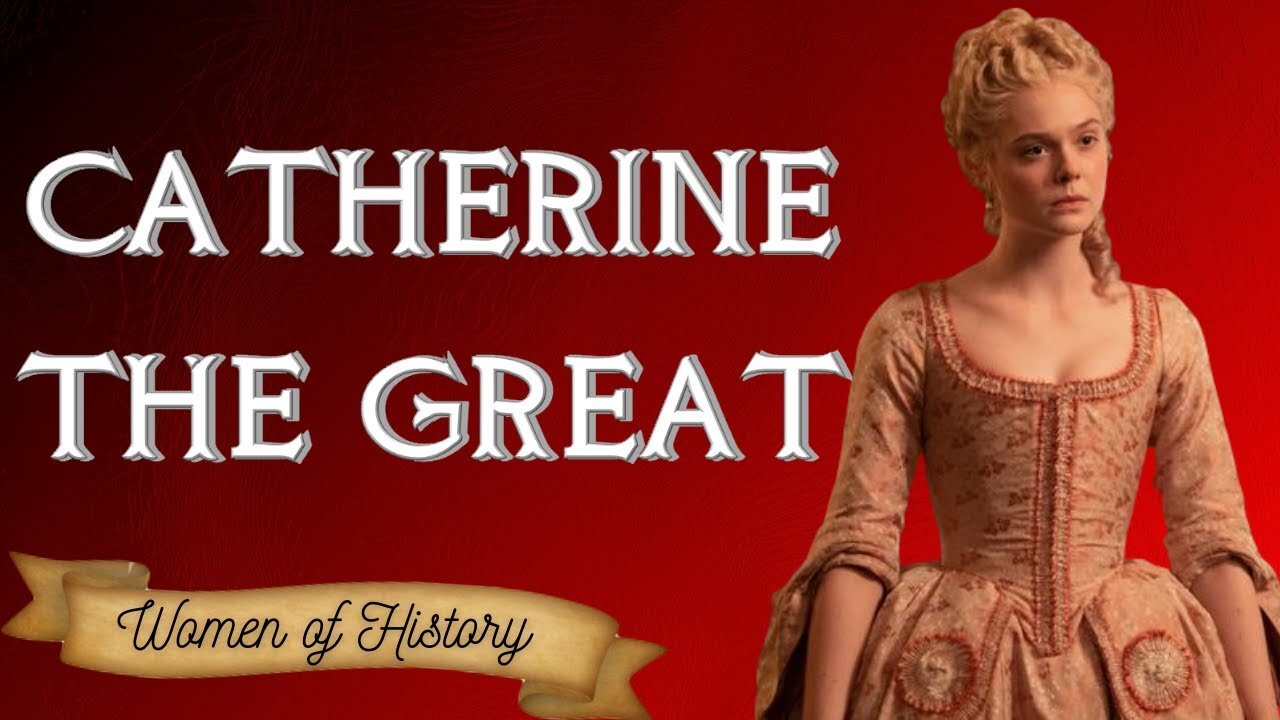Premium Only Content

Catherine The Great - Empress of All Russia 1762 - 1796
Catherine II (born Sophie of Anhalt-Zerbst; 2 May 1729 – 17 November 1796), most commonly known as Catherine the Great,[c] was Empress of All Russia from 1762 until 1796 – the country's longest-ruling female leader. She came to power following a coup d'état that overthrew her husband and second cousin, Peter III. Under her reign, Russia grew larger, its culture was revitalised, and it was recognized as one of the great powers worldwide.
In her accession to power and her rule of the empire, Catherine often relied on her noble favourites, most notably Count Grigory Orlov and Grigory Potemkin. Assisted by highly successful generals such as Alexander Suvorov and Pyotr Rumyantsev, and admirals such as Samuel Greig and Fyodor Ushakov, she governed at a time when the Russian Empire was expanding rapidly by conquest and diplomacy. In the south, the Crimean Khanate was crushed following victories over the Bar confederation and Ottoman Empire in the Russo-Turkish War, 1768-1774 due to the support of the United Kingdom, and Russia colonised the territories of Novorossiya along the coasts of the Black and Azov Seas. In the west, the Polish–Lithuanian Commonwealth, ruled by Catherine's former lover, King Stanisław August Poniatowski, was eventually partitioned, with the Russian Empire gaining the largest share. In the east, Russia started to colonise Alaska, establishing Russian America.
Catherine reformed the administration of Russian guberniyas (governorates), and many new cities and towns were founded on her orders. An admirer of Peter the Great, Catherine continued to modernize Russia along Western European lines. However, military conscription and the economy continued to depend on serfdom, and the increasing demands of the state and of private landowners intensified the exploitation of serf labour. This was one of the chief reasons behind rebellions, including the large-scale Pugachev Rebellion of Cossacks, nomads, peoples of Volga and peasants.
The period of Catherine the Great's rule, the Catherinian Era, is considered a Golden Age of Russia. The Manifesto on Freedom of the Nobility, issued during the short reign of Peter III and confirmed by Catherine, freed Russian nobles from compulsory military or state service. Construction of many mansions of the nobility, in the classical style endorsed by the empress, changed the face of the country. She enthusiastically supported the ideals of the Enlightenment and is often included in the ranks of the enlightened despots. As a patron of the arts, she presided over the age of the Russian Enlightenment, including the establishment of the Smolny Institute for Noble Maidens, the first state-financed higher education institution for women in Europe.
#WomenofHistory #HistoricalWomen #FamousFemales
-
 12:35
12:35
Parry This
1 year agoThe Hussite Civil War Explained - Medieval Bohemian History
83 -
 3:59:36
3:59:36
StevieTLIVE
6 hours agoFriday Night Warzone HYPE
33.9K1 -
 3:47:10
3:47:10
SynthTrax & DJ Cheezus Livestreams
1 day agoFriday Night Synthwave 80s 90s Electronica and more DJ MIX Livestream Michael Jackson / AI Art Compilation Edition
39.9K -
 1:03:57
1:03:57
Sarah Westall
6 hours agoMara Lago Accord Joins the Fed, Fed Waves the White Flag & more w/ Andy Schectman
22K -
 2:44:12
2:44:12
I_Came_With_Fire_Podcast
1 day ago*BREAKING* Special Guest Katarina Szulc
32K5 -
 3:22:20
3:22:20
megimu32
6 hours agoOFF THE SUBJECT: FAFO Friday! Bodycams & Mario Kart Mayhem!
21.6K4 -
 55:36
55:36
Flyover Conservatives
1 day ago4 Strategies to Create Opportunity from Nothing - Clay Clark | FOC Show
27.3K -
 1:49
1:49
Gaming on Rumble
11 hours agoWhat is the Rumble Creator Program!?!? (Active Premium Creators) | Lvl UP
27.3K2 -
 5:56:26
5:56:26
Midnight In The Mountains
8 hours agoGaming w/ PER·SE·VER·ANCE | Midnights Play Fortnite | Split Screen Action!
18.2K2 -
 3:56:17
3:56:17
Nerdrotic
10 hours ago $13.80 earnedLet's TACO-bout Take Us North, Hollywood COPE! Cracker Barrel CRACKED! | Friday Night Tights 369
95.2K8